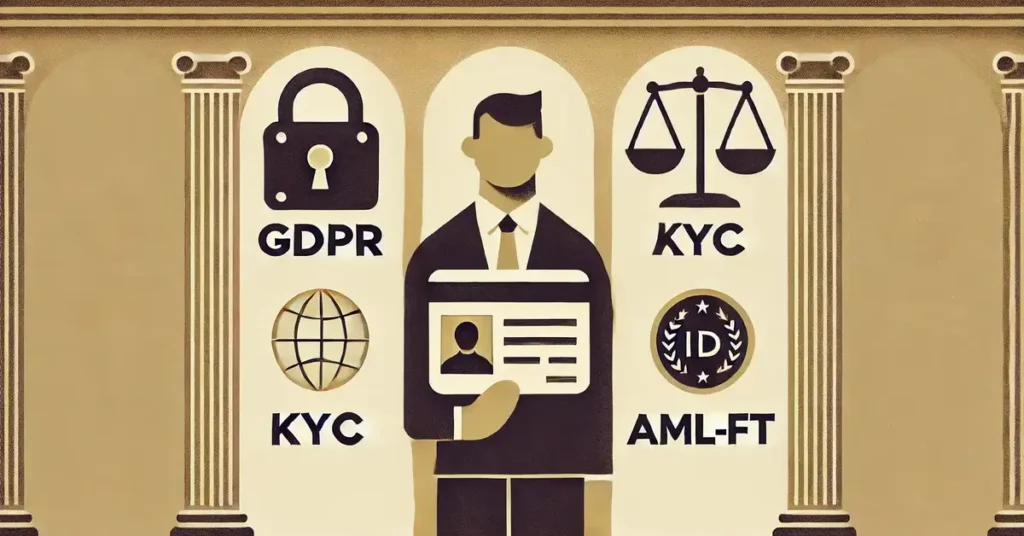1. Introduction
In recent years, the topic of identity and personal data protection has become crucial. The rise of digital technology has led to a surge in online interactions, potential fraud, and risks linked to the improper use of personal information. In order to regulate and secure these uses, various legal frameworks have been introduced or strengthened.
Among them, three major acronyms often come up: GDPR (General Data Protection Regulation), KYC (Know Your Customer), and AML-CFT (Anti-Money Laundering and Counter-Terrorist Financing, referred to in French as LCB-FT). But what do they actually mean? What obligations do they impose regarding identity? That’s what we’ll explore together.
2. Understanding the Acronyms and Their Importance
2.1. What Is GDPR ?
GDPR, or the General Data Protection Regulation, is a piece of European legislation that came into effect in May 2018. Its main objective is to protect the personal data of European Union citizens, in particular by :
- Making companies and organizations more accountable for how they collect and process data.
- Giving individuals greater control over their information (right of access, right to be forgotten, data portability).
- Preventing the abusive or unauthorized use of data.
In practice, GDPR requires organizations to prove that they have a legitimate interest or explicit consent to hold and use people’s data. In terms of identity, it means being obligated to justify the collection of documents (copies of ID cards, passports, etc.) and to implement adequate security measures to avoid any data leaks or hacking.
Link to the original text : European Union website.
2.2. KYC : “Know Your Customer”
KYC (Know Your Customer) literally means “Know Your Client.” It involves verifying the identity and legitimacy of individuals with whom you enter into a business or service relationship. Widely used in the banking and financial sectors, KYC is also practiced in other areas (payment platforms, marketplaces, etc.).
It serves several purposes :
- Fighting fraud : Ensuring that the person stated is indeed the one making the transaction or subscription.
- Protecting the company’s reputation : Verifying that the future client is not on any lists of individuals wanted for criminal or terrorist activities.
- Complying with legal obligations : Particularly those related to AML-CFT (see below).
In concrete terms, KYC procedures involve requesting identity documents, verifying their authenticity, and sometimes performing automated checks (facial recognition software, signature verification, etc.).
2.3. AML-CFT: Anti-Money Laundering and Counter-Terrorist Financing
AML-CFT refers to all laws and regulations aimed at detecting and preventing money laundering and terrorist financing. In the European Union, several directives have been adopted to reinforce these measures. The companies involved (banks, insurers, crypto-asset platforms, etc.) must:
- Put in place alert procedures and enhanced vigilance.
- Monitor suspicious transactions and report them to the competent authorities (in France, this would be TRACFIN).
- Keep evidence of their clients’ identities and the nature of transactions.
KYC is closely linked to AML-CFT: the first step in fighting money laundering is to ensure you truly know the identity of the person carrying out the transaction.
Individuals, do you occasionally need to verify one or more identity documents? Discover eligible documents in the store !
Small businesses, do you need to verify one or more identity documents via a web application? Discover the identity web suite!
Professionals, do you need to integrate proof of identity validation into one of your business processes, including all European identity cards and global passports? Discover our API with web application to validate the authenticity of an identity document in less than 10s!
3. Legal Obligations Regarding Identity
3.1. Collecting and Processing Personal Data
Whenever an organization (bank, e-merchant, nonprofit, etc.) collects identity documents or sensitive information, it must do so on a clear legal basis. Such a basis may include :
- Consent : The individual explicitly agrees to the collection and use of their data.
- Legal obligation : The law requires the collection (e.g., when opening a bank account).
- Legitimate interest : The organization has a legitimate interest in collecting this data, but it must ensure this does not infringe on the individual’s fundamental rights.
The purpose limitation principle stipulates that data cannot be used for anything other than the initially stated purpose. Thus, if an ID document is requested for KYC checks, it cannot be used for marketing purposes unless the person has been informed and has consented.
3.2. Identity Verification and Record-Keeping
Under GDPR, personal data must only be retained for as long as necessary for the stated purposes. However, under the legal obligations related to AML-CFT, you may be required to keep this data longer (often five years, or even more depending on the situation) in order to justify the verifications carried out.
These obligations notably include :
- Collecting and verifying official documents (national ID, passport, driver’s license, etc.).
- Securely storing these documents in a protected database (encryption, restricted access).
- Keeping a record of checks : Maintaining a register to prove that the identity verification was properly carried out.
3.3. Reporting and Notification
Professionals subject to AML-CFT requirements must be especially vigilant about unusual or suspicious transactions :
- Suspicious activity reporting : If a transaction appears to involve illicit funds or is related to the financing of criminal activities, the company must report it to the authorities (TRACFIN in France).
- Ongoing monitoring : Beyond simply opening an account, monitoring operations over time is crucial to detect any potentially risky behavior.
4. Risks and Penalties
4.1. Risks of Non-Compliance
- Financial penalties : The fines under GDPR can reach up to €20 million or 4% of a company’s worldwide annual turnover (whichever is higher). Regarding AML-CFT, financial regulators can also impose very heavy penalties on a bank or financial institution in the event of violations.
- Reputational risks : Beyond financial penalties, media coverage of security breaches or lack of compliance can seriously damage a company’s reputation and drive away customers.
4.2. Concrete Examples
- Data leak scandals : Several major tech companies have already been fined for data protection breaches.
- Sanctioned banks : Some banks have received substantial fines for failing to properly implement their due diligence and reporting obligations under AML-CFT rules.
5. Best Practices and Compliance
5.1. Implementing Internal Procedures
A crucial first step is to conduct an audit of the data collected: which information is held, for what purpose, who has access to it, and so on. This makes it possible to :
- Identify potential non-compliance issues.
- Put in place clear procedures for collecting, verifying, and storing identity documents.
- Train and educate staff on data protection, KYC, and AML-CFT issues.
5.2. Equipping Yourself with Tools and Technological Solutions
To improve efficiency and reliability :
- KYC/AML Software : Automates identity verification, checks document validity, and performs cross-referencing with official databases or international sanctions lists.
- Electronic Consent Management : Keeps records of when and how a person consented to the use of their data, a key GDPR requirement.
- Regular Updates and Maintenance : Tools must be kept up to date to remain effective against evolving fraudulent practices.
5.3. Working with Experts
- DPO (Data Protection Officer) : Required for public bodies and companies that process a large volume of sensitive data. This role is critical for advising and staying on top of regulatory changes.
- Specialized Firms : Can help draft internal policies, create charters, and run specialized training programs, particularly in highly regulated sectors like banking, insurance, or cryptocurrency.
6. Future Developments
6.1. New European Regulations
Legislation and regulations regarding personal data and identification are constantly evolving. States and the European Union are working on new directives to further reinforce transparency and accountability, particularly concerning :
- Digital identity : New tools (digital wallets, eIDAS) facilitate online identification while respecting privacy.
- Cryptocurrencies : New rules are in the works aimed at limiting anonymous transactions.
6.2. Technological Innovations and Privacy Protection
Blockchain or decentralized storage solutions are sometimes promoted as ways to create more secure and traceable identity systems. Research is ongoing to enable users to prove their identity or specific attributes (age, nationality, etc.) without disclosing all their sensitive data.
It’s likely that self-sovereign identity (SSI) methods will emerge in the coming years, giving citizens greater control over their information.
7. Conclusion
Safeguarding identity and personal data is now a major concern for individuals, companies, and regulators. GDPR sets the overall framework for data protection in the EU, while KYC procedures and AML-CFT obligations demand heightened scrutiny when verifying and securing client identities.
The risks of non-compliance are high—both financially and in terms of reputation. Nonetheless, best practices and tools do exist: internal audits, staff training, adoption of automated verification solutions, and more.
In an ever-changing legislative and technological environment, staying informed and regularly updating one’s processes is crucial. Identity and data protection issues will only continue to gain prominence. It is therefore wise to plan ahead and build a trusting relationship with clients and partners on the basis of robust and transparent compliance.
In short, understanding and adhering to GDPR, implementing appropriate KYC procedures, and complying with AML-CFT obligations are no longer optional but essential requirements. A well-thought-out identity strategy can protect individuals, secure businesses, and foster a more reliable digital environment for everyone.
Individuals, do you occasionally need to verify one or more identity documents? Discover eligible documents in the store !
Small businesses, do you need to verify one or more identity documents via a web application? Discover the identity web suite!
Professionals, do you need to integrate proof of identity validation into one of your business processes, including all European identity cards and global passports? Discover our API with web application to validate the authenticity of an identity document in less than 10s!



